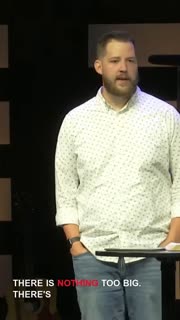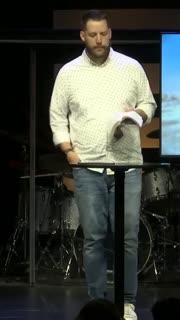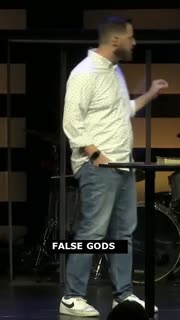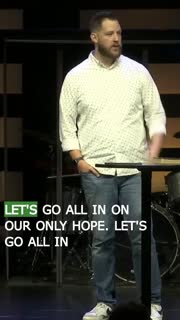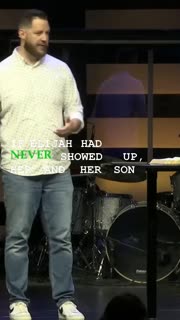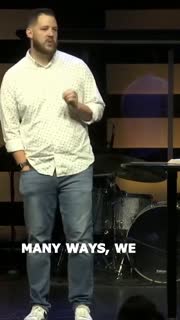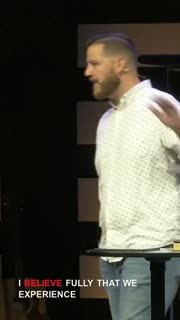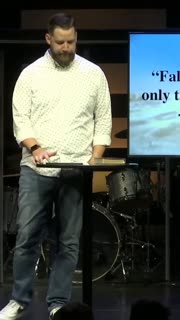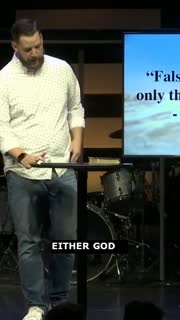Elijah: Faith, Idolatry, and God's Miraculous Power
Devotional
Sermon Summary
Bible Study Guide
Sermon Clips
### Quotes for outreach
1. "An idol is anything that you put on the throne of your life other than God. Anything that you make the most important thing in your life other than God, if anything else, is that. That's an idol in your life. For some of us, we have fallen into the idol of money or material possessions. And what is most important to us is more and more and bigger and better." [28:53] (33 seconds)
2. "There is nothing too big. There's nothing that would require too much power for our God. There's nothing beyond him. There's no situation in our lives that he looks into and says that's not something I can handle. And while he doesn't always handle it the way that we think he should or the way that we want him to, we should never believe the lie that he can't. Our God is always enough." [39:59] (38 seconds)
3. "Cross point, God's desire is to be reconciled to you. God's desire, the work of God over and over and over again in scripture, and it doesn't start with Jesus. The work of God for hundreds and thousands of years now is to seek the reconciliation of his creation, his people, you. You are loved by him and he has been seeking after you your whole life." [43:22] (35 seconds)
4. "False gods promise what only the true God provides. False gods promise what only the true God provides. And if we think about it, it is absolutely true, right? They make promises. The things that we chase after, there's a promise there. There's a hope there. But only God can provide. Only God can fulfill. Only God will never fail." [48:50] (33 seconds)
5. "Let's go all in on our only hope. Let's go all in on the one who we know has power beyond our wildest imagination. Let's go all in on the God of Abraham, Isaac, and Jacob." [54:11] (16 seconds)
### Quotes for members
1. "If Elijah had never showed up, her and her son would already be dead. But she places this blame on Elijah. And then Elijah, we get to see at the end of chapter 17, this incredible faith of Elijah as he goes upstairs with this boy's body and prays over it and asks God to breathe life back into this boy. And it is the first time in recorded history that we see God's power over death." [19:19] (28 seconds)
2. "I think that in many ways, we are just as polytheistic as the Israelites were. We just worship different. We practice the same thing sometimes. We as Americans, as Christians, we fall into all kinds of other idols. And here's what I mean by that. Because here's what an idol is. It's not a tiny statue. An idol is anything that you put on the throne of your life other than God." [28:53] (33 seconds)
3. "I believe fully that we experience the power of God all around us all the time. And not in some weird floaty way. I believe that we see the power of God when we see people who lose a loved one and somehow have peace. I don't know how that happens from a human perspective. That pain, there should never be peace again. Never a single moment of it. And yet we experience a promise from God that his spirit will bring peace that passes understanding." [46:59] (37 seconds)
4. "Either God is God or money is God. And look, if money is God, like go on and chase after it. Make the most important thing in your life, filling your bank account. Like you can do it. Get an extra job. It's fine if it destroys your marriage. Like go after it, right? If money is God, do it. But we know, we've seen, we've experienced that the things of this world fail, that it fades." [50:33] (32 seconds)
5. "Either God is God or your political party is. And this is true for us no matter which side of the aisle you sit on politically, either God's words are true, that he is the hope, that he is the restoration, that he is what will bring healing to the brokenness of this world. Or we can place our hope in a political system. And when we say it like that, when we have that moment right now, we face this moment where all of us, I think if we were really honest, we don't really believe at this point that a political system, is going to fix the real issue here on earth." [54:11] (48 seconds)
Ask a question about this sermon
1. "An idol is anything that you put on the throne of your life other than God. Anything that you make the most important thing in your life other than God, if anything else, is that. That's an idol in your life. For some of us, we have fallen into the idol of money or material possessions. And what is most important to us is more and more and bigger and better." [28:53] (33 seconds)
2. "There is nothing too big. There's nothing that would require too much power for our God. There's nothing beyond him. There's no situation in our lives that he looks into and says that's not something I can handle. And while he doesn't always handle it the way that we think he should or the way that we want him to, we should never believe the lie that he can't. Our God is always enough." [39:59] (38 seconds)
3. "Cross point, God's desire is to be reconciled to you. God's desire, the work of God over and over and over again in scripture, and it doesn't start with Jesus. The work of God for hundreds and thousands of years now is to seek the reconciliation of his creation, his people, you. You are loved by him and he has been seeking after you your whole life." [43:22] (35 seconds)
4. "False gods promise what only the true God provides. False gods promise what only the true God provides. And if we think about it, it is absolutely true, right? They make promises. The things that we chase after, there's a promise there. There's a hope there. But only God can provide. Only God can fulfill. Only God will never fail." [48:50] (33 seconds)
5. "Let's go all in on our only hope. Let's go all in on the one who we know has power beyond our wildest imagination. Let's go all in on the God of Abraham, Isaac, and Jacob." [54:11] (16 seconds)
### Quotes for members
1. "If Elijah had never showed up, her and her son would already be dead. But she places this blame on Elijah. And then Elijah, we get to see at the end of chapter 17, this incredible faith of Elijah as he goes upstairs with this boy's body and prays over it and asks God to breathe life back into this boy. And it is the first time in recorded history that we see God's power over death." [19:19] (28 seconds)
2. "I think that in many ways, we are just as polytheistic as the Israelites were. We just worship different. We practice the same thing sometimes. We as Americans, as Christians, we fall into all kinds of other idols. And here's what I mean by that. Because here's what an idol is. It's not a tiny statue. An idol is anything that you put on the throne of your life other than God." [28:53] (33 seconds)
3. "I believe fully that we experience the power of God all around us all the time. And not in some weird floaty way. I believe that we see the power of God when we see people who lose a loved one and somehow have peace. I don't know how that happens from a human perspective. That pain, there should never be peace again. Never a single moment of it. And yet we experience a promise from God that his spirit will bring peace that passes understanding." [46:59] (37 seconds)
4. "Either God is God or money is God. And look, if money is God, like go on and chase after it. Make the most important thing in your life, filling your bank account. Like you can do it. Get an extra job. It's fine if it destroys your marriage. Like go after it, right? If money is God, do it. But we know, we've seen, we've experienced that the things of this world fail, that it fades." [50:33] (32 seconds)
5. "Either God is God or your political party is. And this is true for us no matter which side of the aisle you sit on politically, either God's words are true, that he is the hope, that he is the restoration, that he is what will bring healing to the brokenness of this world. Or we can place our hope in a political system. And when we say it like that, when we have that moment right now, we face this moment where all of us, I think if we were really honest, we don't really believe at this point that a political system, is going to fix the real issue here on earth." [54:11] (48 seconds)

